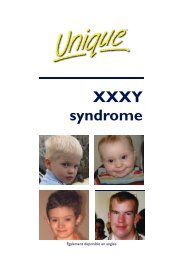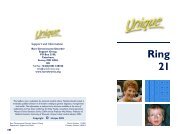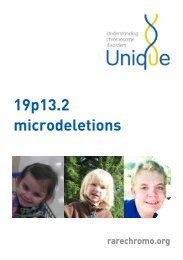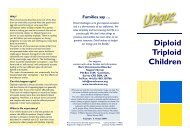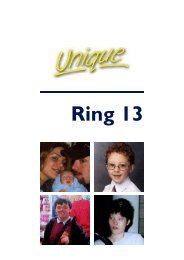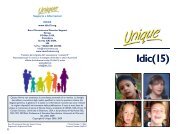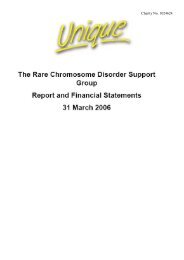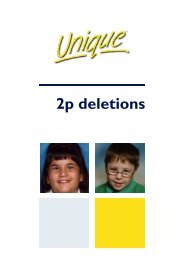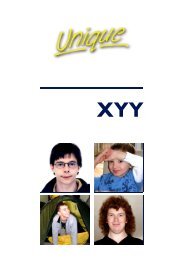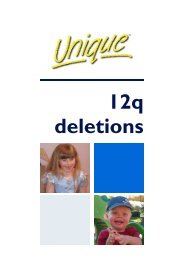Mosaic Trisomy 16
Mosaic Trisomy 16
Mosaic Trisomy 16
You also want an ePaper? Increase the reach of your titles
YUMPU automatically turns print PDFs into web optimized ePapers that Google loves.
Why did it happen?<br />
Almost all MT<strong>16</strong> pregnancies start as a pregnancy with a complete extra<br />
chromosome <strong>16</strong>. During the formation of the egg cells in the mother, an error<br />
occurs in the natural process by which chromosomes separate. This leaves an extra<br />
chromosome <strong>16</strong> in the egg cell. Much more rarely the same mistake occurs when<br />
the father’s sperm cells are forming. After conception, there are three chromosome<br />
<strong>16</strong>s, usually two from the mother and one from the father. A natural attempt to<br />
correct the mistake after conception is then partly successful, leaving two cell lines,<br />
one with the extra chromosome <strong>16</strong>, the other without. This is the process called<br />
correction or trisomy rescue.<br />
Can it happen again?<br />
There is no evidence that couples are likely to have another baby affected by MT<strong>16</strong>.<br />
However, if the original trisomy (third chromosome) was caused by a failure of the<br />
mother’s chromosomes to separate when her egg cells were forming and she is an<br />
older mother (over 35), she may have a raised chance of having another pregnancy<br />
affected by trisomy.<br />
Rare Chromosome Disorder Support Group,<br />
PO Box 2189,<br />
Caterham,<br />
Surrey CR3 5GN, UK.<br />
Tel/Fax: +44(0)1883 330766<br />
info@rarechromo.org<br />
www.rarechromo.org<br />
Disorders of Chromosome <strong>16</strong> Foundation<br />
www.trisomy<strong>16</strong>.org<br />
Unique mentions other organisations’ message boards and websites to help families looking for<br />
information. This does not imply that we endorse their content or have any responsibility for it.<br />
This leaflet is not a substitute for personal medical or genetic advice. Families should<br />
consult a medically qualified clinician in all matters relating to genetic diagnosis,<br />
management and health. The information is believed to be the best available at the<br />
time of publication and the medical content has been verified by<br />
Dr Wendy Robinson, Associate Professor of Medical Genetics, University of British<br />
Columbia and Monica Pearson BSc 2004.<br />
Copyright © Unique 2005<br />
8<br />
Rare Chromosome Disorder Support Group Charity Number 1110661<br />
Registered in England and Wales Company Number 5460413



